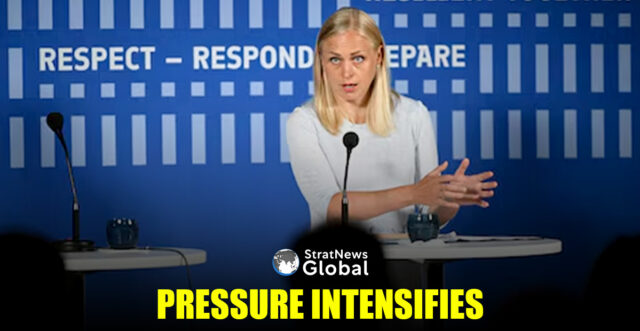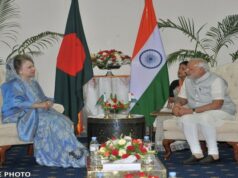Finland‘s foreign minister, Elina Valtonen, said on Friday in a Reuters NEXT Newsmaker interview that United States President Donald Trump should impose more sanctions on Russia to help end the war in Ukraine.
Trump set Friday as the deadline by which Russia had to agree to peace in Ukraine or have its oil customers face secondary tariffs. If imposed, they would sever a major source of funding for Russian President Vladimir Putin’s war effort.
However, Putin and Trump are now expected to meet as early as next week following talks between the Russian leader and U.S. special envoy Steve Witkoff in Moscow on Wednesday, raising the possibility that the new sanctions may be delayed or cancelled.
A White House official said on Wednesday that the secondary sanctions were still expected to be implemented against countries doing business with Russia from Friday, despite the latest diplomatic flurry.
“I certainly hope that President Trump will move forward with those sanctions,” Elina Valtonen said in the interview, referring to the secondary sanctions that could especially impact China and India, the biggest purchasers of Russian oil.
Europe Coordinates Ukraine Strategy
Finland’s President Alexander Stubb was among several European leaders to join a phone call with Trump on Wednesday designed to coordinate Western efforts to end the Ukraine war.
Valtonen said continued Western arms supplies to Kyiv also had a vital role to play in pressuring Putin to end the war, which began in February 2022 with Russia’s full-scale invasion of Ukraine.
“What we do see… is that the reason that Russia has again shown some willingness to talk, is that the increased arms deliveries (to Ukraine) are definitely piling up the pressure on Russia to find a way out of the war,” she said.
Finland, along with other Nordic countries and the three Baltic states, has been among Ukraine’s staunchest supporters.
The 2022 invasion prompted Finland, which shares a 1,340-km (833-mile) border with Russia, to join NATO two years ago, upending decades of non-alignment. Valtonen became the foreign minister two months after that historic step was taken.
The Russian state’s fiscal situation is not as good as it was three years ago, and its economic situation is even worse, Valtonen said, referring to the impact of sanctions and a massive diversion of resources in Russia to the war effort.
“We need to be piling up on the pressure, and then hope that Russia will react positively one day, which means that they will end their invasion,” she said.
Gaza
Asked about the situation in Gaza, Valtonen expressed “great worry” over a decision by Israel’s security cabinet to approve a plan on Friday to take control of Gaza City in an expansion of military operations despite intensifying criticism at home and abroad over the devastating nearly two-year-old war.
On Thursday, asked if Israel would take over the entire coastal territory, Netanyahu told Fox News Channel in an interview: “We intend to.”
“We do think that it is so important now… to keep alive the prospect for the two-state solution, even though it looks very difficult at this moment,” she said, referring to the creation of a sovereign Palestinian state alongside Israel.
France, Britain and Canada have announced plans in recent weeks to recognise an independent Palestinian state, but Valtonen signalled that Finland has no immediate plans to do so.
“There have to be concrete steps, which essentially means that there will be a mutual recognition of a Palestinian state at some point (with Israel), but also the normalisation of relations between Arab countries … and with Israel,” she said.
(With inputs from Reuters)





